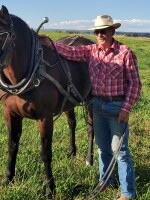Agriculture was a bit of a contentious topic at the recent Glasgow Climate Summit. A representative of the Humane Society International claimed that animal agriculture is responsible for at least 14.5-16.5% of human-induced greenhouse gas emissions globally, and that the livestock sector is projected to account for nearly 50% of the global emissions by 2030. Secretary of Agriculture Tom Vilsack said that the current administration is against the viewpoint that animal agriculture must end, and that the only way to reduce emissions from livestock is to reduce the amount of livestock raised. He pointed out that the USDA is pursuing multiple workstreams to reduce methane emissions from the agricultural sector, including the adoption of alternative manure management systems, expanding on-farm generation of natural gas, and using renewable energy for agricultural production activities.
On the topic of climate change, Dr. Harwood Schaffer and Dr. Daryll Ray:at the University of Tennessee’s Agricultural Policy Analysis Center recently posed the question of whether the increasing demand for fresh water fish among US consumers, represents an opportunity for some farmers in the U.S. to raise more fresh water catfish, tilapia, and steelhead trout. At present, much of this fish is raised in Asia, and brought to the U.S. by air freight at a high carbon footprint. They point out that domestic production of these fish would cut out a whole lot of high carbon output air miles.
In 2019, industrial hemp was hailed as gold mine for farmers who were willing to grow the crop for CBD oil and fiber. That year, about 195,000 acres of the crop were planted, although only 104,000 acres were harvested. Over the past two years the number of hemp acres have dropped dramatically. This year, only 35,000 acres of hemp were planted, and 33,000 acres harvested, according to Hemp Benchmarks. Indications are that the market has shifted from production of CBD oil to the production of fiber for building materials like fiber board, concrete reinforcement and various other products, including an all hemp airplane that’s fueled by hemp oil.
In June and July of this year, there was a lot of attention payed to congressional hearings concerning the perceived lack of competition in the meat packing industry. At the time, it was hard to tell if anything but bombastic rhetoric would come out of Washington. But the bipartisan, a word we haven’t heard very often lately in relation congress, Cattle Price Discovery and Transparency Act, will be introduced this week by Senators Deb Fischer, R-Nebraska, Chuck Grassley, R-Iowa, Jon Tester, D-Montana, and Ron Ryden, D Oregon. According to the legislation’s sponsors, the act addresses many of the concerns that the cattle industry has identified about the disparity between what producers are receiving and the prices consumers pay at the retail level. If passed, the legislation will enhance price discovery and transparency by requiring packers to participate in the cash market on a plant-by-plant basis within each major cattle feeding region, and require other reports that will provide information to the public.
Author E. B. White wrote, “A good farmer is nothing more or less than a handy man with a sense of humor.”



